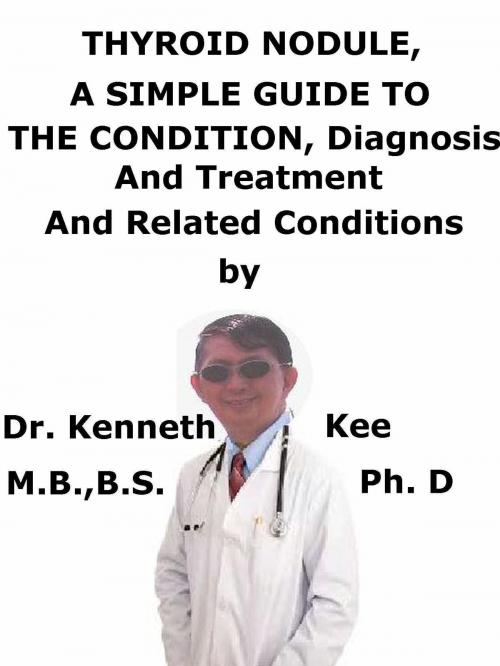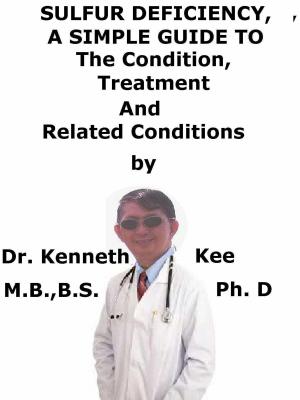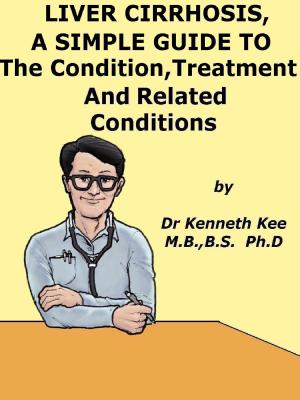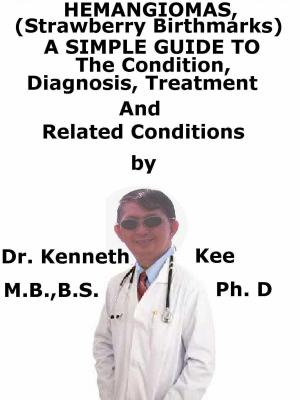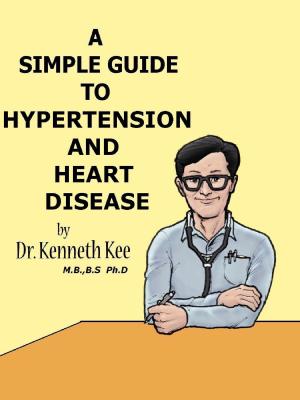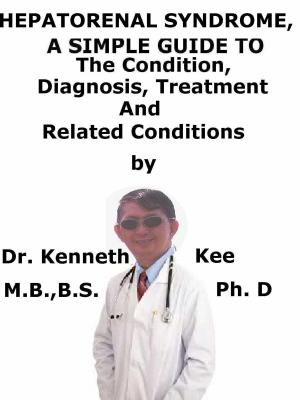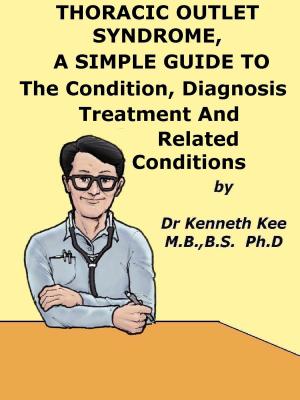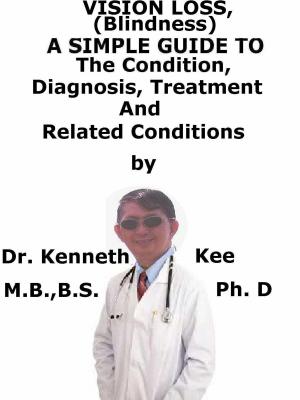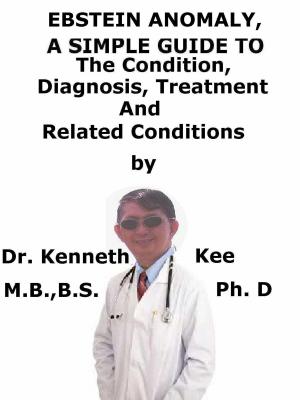Thyroid Nodule, A Simple Guide To The Condition, Diagnosis, Treatment And Related Conditions
Nonfiction, Health & Well Being, Medical, Specialties, Internal Medicine, Endocrinology & Metabolism| Author: | Kenneth Kee | ISBN: | 9781310088100 |
| Publisher: | Kenneth Kee | Publication: | February 25, 2016 |
| Imprint: | Smashwords Edition | Language: | English |
| Author: | Kenneth Kee |
| ISBN: | 9781310088100 |
| Publisher: | Kenneth Kee |
| Publication: | February 25, 2016 |
| Imprint: | Smashwords Edition |
| Language: | English |
Thyroid nodule is medical disorder in which an abnormal swelling forms when the thyroid tissues starts to proliferate in one part of the thyroid gland.
A thyroid nodule is a lump (growth) in the thyroid gland.
The thyroid gland is located in the neck, just above where the collarbones meet in the middle.
Who are at risk of thyroid nodule?
1. Thyroid nodules are found 4x more in females than in male.
2. However the thyroid nodules in males are more prone to malignancy than in females
3. Thyroid nodules occur more in the 30-60 age group.
Causes:
Thyroid nodules are growths of cells in the thyroid gland.
These growths can be:
1. Not cancer (benign) or thyroid cancer
2. Fluid-filled (cysts)
3. One nodule or a group of small nodules
4. Producing thyroid hormones (hot) or not making thyroid hormones (cold)
5. Thyroid nodules are more frequent in women than in men.
6. A person's chance of getting a thyroid nodule increases with age.
7. Only a few thyroid nodules are due to thyroid cancer.
A thyroid nodule is more likely to be cancer if you:
1. Have a hard nodule
2. Have a nodule that is stuck to nearby structures
3. Have a family history of thyroid cancer
4. Have noticed a change in the voice
5. Are younger than 20 or older than 70
6. Have a history of radiation exposure to the head or neck
7. Are male
Causes of thyroid nodules are not always found, but can include:
1. Hashimoto's disease
2. Lack of iodine in the diet
What are the different types of Thyroid Nodules?
1. Solid - solid thyroid nodules that do not necessary feel hard
2. Cystic - the nodules contain fluid.
3. Benign - non malignant
4. Malignant - cancerous
What are the symptoms and signs of Thyroid Nodules?
Symptoms:
Most thyroid nodules do not cause symptoms.
There are usually no obvious symptoms
Big thyroid nodules can press against structures in the neck, causing symptoms such as:
1. Obvious swelling in the thyroid gland
Goiter or an enlarged thyroid gland or lump in the neck
2. Neck swelling -suggest presence of spread to the lymph node
3. Hoarseness or changing voice
Hoarseness of voice may occur if there is pressure on the vocal cord or recurrent nerve to vocal cord
4. Pain in the neck
5. Dyspnea or breathlessness if there is pressure on the trachea
There are problems breathing, especially when lying down flat
6. Dysphagia or difficulty in swallowing due to pressure on the esophagus
There are also problems swallowing food
Nodules that produce thyroid hormones tend to produce symptoms of hyper-active thyroid gland, including:
1. Warm, sweaty skin
2. Fast pulse
3. Increased appetite
4. Nervousness
5. Restlessness
6. Skin blushing or flushing
7. Weight loss
8. Irregular menstrual periods
Thyroid nodules are sometimes present in people with Hashimoto's disease, which may cause symptoms of an under active thyroid gland, such as:
1. Dry skin
2. Face swelling
3. Fatigue
4. Hair loss
5. Feeling cold when other people do not
6. Weight gain
7. Irregular menstrual periods
TABLE OF CONTENT
Introduction
Chapter 1 Thyroid Nodule
Chapter 2 Causes
Chapter 3 Symptoms
Chapter 4 Diagnosis
Chapter 5 Treatment
Chapter 6 Prognosis
Chapter 7 Goiter
Chapter 8 Thyroid Cancer
Epilogue
Thyroid nodule is medical disorder in which an abnormal swelling forms when the thyroid tissues starts to proliferate in one part of the thyroid gland.
A thyroid nodule is a lump (growth) in the thyroid gland.
The thyroid gland is located in the neck, just above where the collarbones meet in the middle.
Who are at risk of thyroid nodule?
1. Thyroid nodules are found 4x more in females than in male.
2. However the thyroid nodules in males are more prone to malignancy than in females
3. Thyroid nodules occur more in the 30-60 age group.
Causes:
Thyroid nodules are growths of cells in the thyroid gland.
These growths can be:
1. Not cancer (benign) or thyroid cancer
2. Fluid-filled (cysts)
3. One nodule or a group of small nodules
4. Producing thyroid hormones (hot) or not making thyroid hormones (cold)
5. Thyroid nodules are more frequent in women than in men.
6. A person's chance of getting a thyroid nodule increases with age.
7. Only a few thyroid nodules are due to thyroid cancer.
A thyroid nodule is more likely to be cancer if you:
1. Have a hard nodule
2. Have a nodule that is stuck to nearby structures
3. Have a family history of thyroid cancer
4. Have noticed a change in the voice
5. Are younger than 20 or older than 70
6. Have a history of radiation exposure to the head or neck
7. Are male
Causes of thyroid nodules are not always found, but can include:
1. Hashimoto's disease
2. Lack of iodine in the diet
What are the different types of Thyroid Nodules?
1. Solid - solid thyroid nodules that do not necessary feel hard
2. Cystic - the nodules contain fluid.
3. Benign - non malignant
4. Malignant - cancerous
What are the symptoms and signs of Thyroid Nodules?
Symptoms:
Most thyroid nodules do not cause symptoms.
There are usually no obvious symptoms
Big thyroid nodules can press against structures in the neck, causing symptoms such as:
1. Obvious swelling in the thyroid gland
Goiter or an enlarged thyroid gland or lump in the neck
2. Neck swelling -suggest presence of spread to the lymph node
3. Hoarseness or changing voice
Hoarseness of voice may occur if there is pressure on the vocal cord or recurrent nerve to vocal cord
4. Pain in the neck
5. Dyspnea or breathlessness if there is pressure on the trachea
There are problems breathing, especially when lying down flat
6. Dysphagia or difficulty in swallowing due to pressure on the esophagus
There are also problems swallowing food
Nodules that produce thyroid hormones tend to produce symptoms of hyper-active thyroid gland, including:
1. Warm, sweaty skin
2. Fast pulse
3. Increased appetite
4. Nervousness
5. Restlessness
6. Skin blushing or flushing
7. Weight loss
8. Irregular menstrual periods
Thyroid nodules are sometimes present in people with Hashimoto's disease, which may cause symptoms of an under active thyroid gland, such as:
1. Dry skin
2. Face swelling
3. Fatigue
4. Hair loss
5. Feeling cold when other people do not
6. Weight gain
7. Irregular menstrual periods
TABLE OF CONTENT
Introduction
Chapter 1 Thyroid Nodule
Chapter 2 Causes
Chapter 3 Symptoms
Chapter 4 Diagnosis
Chapter 5 Treatment
Chapter 6 Prognosis
Chapter 7 Goiter
Chapter 8 Thyroid Cancer
Epilogue
